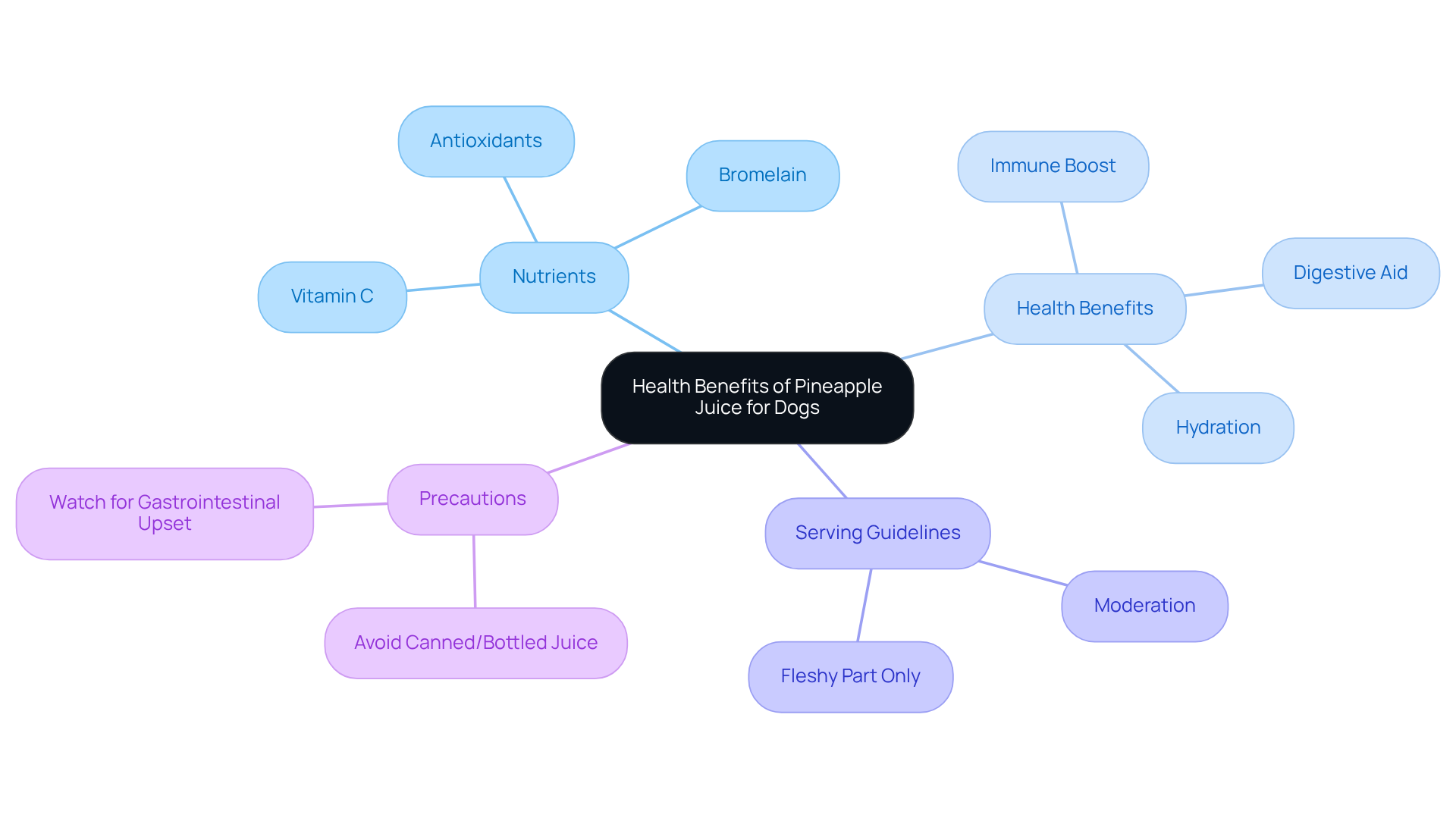

Can Dogs Eat Pineapple Juice? Safe Introduction Steps and Benefits
by Lena Park
Last updated: August 18, 2025
Verified and Approved by:
Angela Morris,
MSW, LCSW
Fact Checked

Overview
It’s heartening to know that dogs can safely enjoy pineapple juice in moderation, as long as it is freshly squeezed and free from added sugars and preservatives. This delightful juice not only provides hydration but also offers health benefits, including vitamin C and bromelain. However, as with many treats, it’s essential to be mindful of how much is given. Excessive consumption can lead to gastrointestinal issues, which can be concerning for our beloved pets. Therefore, it’s vital for pet owners to introduce pineapple juice gradually into their dog’s diet and consult a veterinarian if there are any uncertainties. Your furry friend deserves the best, and being informed helps ensure their health and happiness.
Introduction
Pineapple juice, with its vibrant flavor and refreshing properties, often piques the curiosity of dog owners who wonder if this tropical treat is safe for their furry companions.
It’s understandable to have such concerns, as we all want the best for our pets. As it turns out, fresh pineapple juice can offer a range of health benefits, from hydration to digestive support, when introduced correctly.
However, it’s important to navigate the potential risks, such as high sugar content and digestive sensitivity, to ensure our dogs can enjoy this fruity delight without adverse effects.
How can we approach this delicious option while keeping our beloved pets’ well-being in mind?
Determine If Pineapple Juice Is Safe for Dogs
Before you present fruit extract to your beloved dog, it’s truly essential to evaluate whether can dogs eat pineapple juice safely. When considering if can dogs eat pineapple juice, it’s important to note that fresh-squeezed fruit extract can be a delightful and safe snack for pets when offered in moderation, as the fruit contains 82-86% water, making it an excellent option to keep your furry friend hydrated.
However, it’s important to consider whether can dogs eat pineapple juice, ensuring that this extract is free from added sugars and preservatives. On the other hand, canned or bottled fruit liquid is not safe for dogs due to the sugary syrup it often contains, leading to concerns about whether can dogs eat pineapple juice.
Additionally, excessive consumption of pineapple juice can cause gastrointestinal issues, so pet owners often wonder, can dogs eat pineapple juice? It’s always a good idea to talk to your veterinarian before introducing any new foods into your dog’s diet, especially to ask, can dogs eat pineapple juice? This ensures that you make informed decisions that are suited to your pet’s wellness requirements.
As Dr. Annalisa Costale observes, a combination of bromelain and quercetin can enhance digestive well-being, leading to the question of can dogs eat pineapple juice, and highlighting the significance of expert advice when incorporating new foods into your pet’s routine.

Explore the Health Benefits of Pineapple Juice for Dogs
Many pet owners wonder, can dogs eat pineapple juice, considering that pineapple extract offers a variety of nutrients that can significantly enhance your dog’s health. It’s particularly rich in vitamin C, which plays a crucial role in boosting the immune system, helping our furry friends resist illnesses. Additionally, this tropical fruit’s extract contains bromelain, an enzyme celebrated for its digestive benefits and anti-inflammatory properties, making it a wonderful addition to your dog’s diet. With pineapples composed of 80% to 89% water, they provide excellent hydration for dogs, especially during those warm summer days. The antioxidants present in the fruit extract also help combat oxidative stress, promoting overall well-being.
However, it’s important to serve fruit drinks in moderation, especially when asking if can dogs eat pineapple juice, as canned or bottled varieties may contain excess sugar that could upset your dog’s stomach. To maximize these health benefits, ensure that the fruit extract complements a balanced diet rather than replacing it. As Dr. Kristin Michael, D.V.M., advises, puppies can enjoy a few bites of this tropical delight as long as they are old enough to handle more solid foods. It’s essential that dogs only consume the fleshy inner part, steering clear of the skin and core. By being mindful of these guidelines, you can help your beloved pet enjoy the many advantages of pineapple extract.

Follow Steps to Safely Introduce Pineapple Juice to Your Dog
To safely introduce pineapple juice to your beloved dog, please follow these gentle steps:
-
Start small by beginning with just a teaspoon of freshly squeezed fruit extract, ensuring to dilute it with water to minimize sugar intake. This thoughtful approach helps to keep your furry friend healthy.
-
Observe your dog closely for any signs of digestive upset, such as vomiting or diarrhea, for 24 hours after you introduce the juice. It’s important to be attentive to their reactions, as every dog is unique.
-
If your dog shows no adverse reactions, you can gradually increase the amount to one or two tablespoons of pineapple juice, which raises the question: can dogs eat pineapple juice, always ensuring it remains diluted. This way, you can continue to treat them with care.
-
Limit the frequency of this fruity delight, offering it as an occasional treat rather than a daily addition to their diet. Remember, treats should only comprise about 10% of your dog’s overall diet.
-
Additionally, be sure to avoid giving your dog the core or skin of the fruit, as these can pose choking hazards. Canned fruit is best avoided due to its high sugar content. Your dog’s health and happiness are what truly matter.

Identify Risks and Precautions When Feeding Pineapple Juice
While pineapple juice can offer some benefits, it’s important to be mindful of the associated risks that may affect your beloved pet:
-
High Sugar Content: Pineapple juice is naturally high in sugars, which can contribute to obesity, dental issues, and gastrointestinal upset, including vomiting and diarrhea, if consumed in large quantities. Limiting intake is crucial for maintaining your dog’s health and happiness.
-
Acidity: The tartness of this tropical fruit extract may lead to stomach discomfort or heartburn, particularly in pets with sensitive digestive systems. Some canines might experience diarrhea after consuming fruit extract, so it’s wise to observe your pet’s response when introducing this beverage into their diet.
-
Allergic Reactions: While rare, some dogs may have sensitivities to pineapple. It’s essential to introduce any new food gradually, watching for signs of an allergic response, such as itching or gastrointestinal distress.
-
Consult Your Vet: For dogs with pre-existing health conditions, especially diabetes or pancreatitis, it’s highly recommended to consult a veterinarian before introducing pineapple juice. This ensures that it aligns with their dietary needs and supports their overall well-being.

Conclusion
Before introducing pineapple juice to your beloved dog, it’s essential to understand both its safety and benefits. Freshly squeezed pineapple juice can serve as a hydrating treat in moderation, yet it’s important to be cautious about sugar content and the possibility of gastrointestinal issues. Consulting with a veterinarian can help tailor dietary choices to your dog’s specific health needs, ensuring they receive the best care.
This article highlights the substantial health benefits of pineapple juice, including its rich vitamin C content and digestive enzymes like bromelain. These nutrients can bolster your dog’s immune system and enhance their overall well-being. However, it’s crucial to introduce this treat gradually and in moderation to prevent any adverse reactions, particularly with canned or bottled varieties that may contain added sugars.
Ultimately, responsible pet ownership means making informed dietary choices for your furry friend. By understanding the risks and benefits associated with pineapple juice, you can ensure that your dog enjoys a healthy and balanced diet. Always prioritize your dog’s health by consulting with a veterinarian and observing their reactions when introducing new foods, fostering a nurturing environment for their well-being.
Frequently Asked Questions
Is pineapple juice safe for dogs?
Fresh-squeezed pineapple juice can be a safe snack for dogs when offered in moderation, as it is hydrating and contains a high percentage of water.
What should I consider before giving my dog pineapple juice?
Ensure that the pineapple juice is free from added sugars and preservatives, as these can be harmful to dogs.
Are canned or bottled pineapple juices safe for dogs?
No, canned or bottled pineapple juices are not safe for dogs due to the sugary syrup they often contain.
Can excessive consumption of pineapple juice cause any issues for dogs?
Yes, excessive consumption of pineapple juice can lead to gastrointestinal issues in dogs.
Should I consult a veterinarian before giving my dog pineapple juice?
Yes, it is always a good idea to talk to your veterinarian before introducing any new foods, including pineapple juice, into your dog’s diet.
What benefits does pineapple juice have for dogs?
Pineapple juice contains bromelain and quercetin, which can enhance digestive well-being. However, moderation and expert advice are important when incorporating it into your pet’s routine.
Certify Your Emotional Support Animal Today

Why You Can Rely on Us?
At Wellness Wag, we believe your pet deserves care rooted in both science and compassion. Each article is carefully researched, written in clear language for pet owners, and then reviewed by qualified professionals to ensure the information is evidence-based, current, and practical for real-life care. Our goal is to help you feel confident in making informed decisions about your pet’s health and well-being.
Reviewed by
Angela Morris, MSW, LCSW
Angela is a licensed clinical social worker with 20 years of experience in patient advocacy and community mental health. She has assisted numerous clients with ESA evaluations and brings a deep understanding of disability accommodations, ensuring that all information is accurate, supportive, and practical.

Written by :
Lena Park
Last Updated :
August 18, 2025












